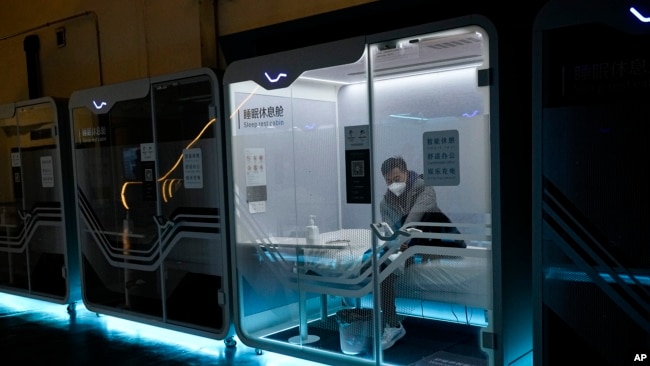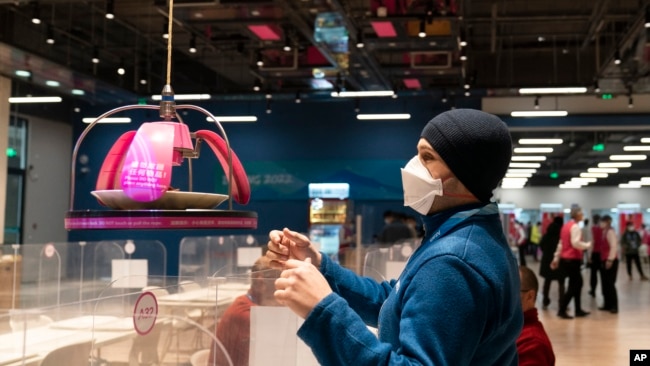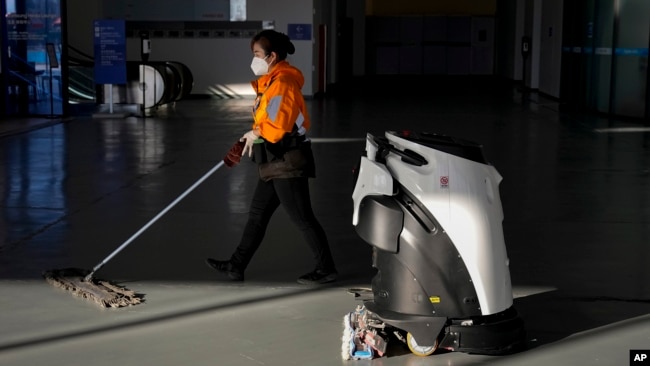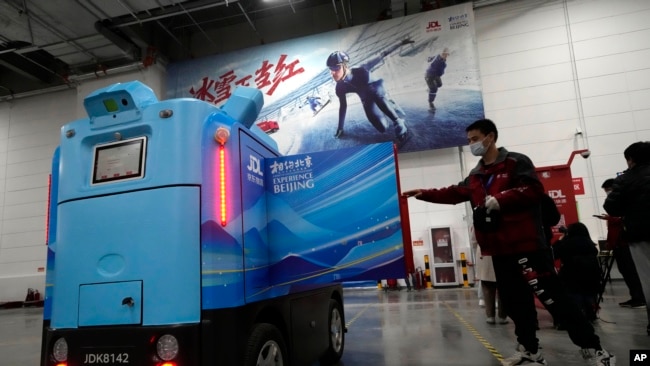”lower-tech versions bed"と評されてしまっています。
ごもっとも!! 災害用段ボールなのですから。。。
2030冬季オリンピック、札幌誘致で、今回の北京五輪と同等のテクノロジーが提供できるのでしょうか?
情報を情報として載せるVOA、政府系ニュースサイトですが、さすがです!!
しかし、溢れるメディア情報に流されているようにも感じる現代、しっかりとした意見は持ちたいものです!!
今日も、VOAで英語を学びましょう!!
北京オリンピックで採用された技術(和訳)
Technologies Used at the Beijing Olympics
February 09, 2022
冬季オリンピックが続く中国で、北京で使われているさまざまなテクノロジーをご紹介します。
ロボット
来場者や選手をサポートするために、さまざまな種類のロボットが配備されています。中には、COVID-19に関連した社会的距離の要件を実施するために使用されているマシンもあります。
また、人と人との接触を制限するために、ロボットが機器の運搬、表面の清掃、食事の準備や運搬を行っています。また、スマートな廃棄物容器や、アルコール飲料やコーヒーを作って提供する機械も利用されています。
スマートベッド
冬季オリンピック村では、選手たちはセンサーを搭載した”スマートベッド”で寝ています。呼吸や心拍数などの情報を収集する装置です。また、”ゼログラビティ”と呼ばれる寝姿勢など、さまざまな寝方を選べるよう制御されています。筋肉や関節への負担を軽減し、より質の高い睡眠をサポートするそうです。
これらのハイテクベッドは、昨年の東京オリンピックでオリンピック選手に提供された低技術版とは全く異なるものです。日本で使用されたベッドは、環境保護の観点からダンボール素材で作られており、その珍しさが注目を浴びました。

A man takes off his shoes in a sleeping pod at the main media center ahead of the 2022 Winter Olympics, Wednesday, Feb. 2, 2022, in Beijing. (AP Photo/Jae C. Hong)
2022年冬季オリンピックを前に、メインメディアセンターのスリーピングポッドで靴を脱ぐ男性(2022年2月2日水曜日、北京にて)。(AP写真/Jae C. Hong)
北京のメディア関係者は、特別な”スリープレスト・キャビン”で選手たちが使っているのと同じベッドを試すことができます。このキャビン(コンテナ)は、記者が中に入って1時間まで休めるようになっています。使用後は完全に清掃されます。
デジタル通貨
中国のデジタルマネーがオリンピックで使用され、外国人を対象とした初の大規模なテストが行われる予定です。外国人観光客は、食事、交通、その他の商品やサービスの支払いに人民元を使用することができます。ユーザーは、アプリをダウンロードするか、デジタル元カードを入手するか、オリンピックエリアにある機械で外貨をデジタルフォームに交換することでこの通貨を手に入れることができます。
過去数年にわたり、中国は主要都市でデジタルマネーのテストを実施してきました。中国政府は、これまでに約138億ドル相当の金融取引にデジタル通貨が使用されたと発表しています。
アプリによる監視
オリンピックに参加するすべての人は、MY2022というアプリを使って、COVID-19を毎日監視する必要があります。このアプリは、オリンピックに参加するための条件として、ユーザーが個人の健康情報を毎日送信することを許可しています。このシステムは、大会期間中のウイルスの蔓延を抑えるための中国の積極的な取り組みの一環です。
 Canadian technician Matthew Potvin reaches for his lunch delivered to him robotically in the dining area of the main media center at the 2022 Winter Olympics, Monday, Jan. 24, 2022, in Beijing. (AP Photo/Jae C. Hong)
Canadian technician Matthew Potvin reaches for his lunch delivered to him robotically in the dining area of the main media center at the 2022 Winter Olympics, Monday, Jan. 24, 2022, in Beijing. (AP Photo/Jae C. Hong)
2022年冬季オリンピックのメインメディアセンターのダイニングエリアで、ロボットで運ばれてくる昼食に手を伸ばすカナダの技術者マシュー・ポットン(2022年1月24日月曜日、北京にて)。(AP写真/Jae C. Hong)
しかし、インターネットのセキュリティを監視するカナダのある団体は、先月発表した報告書で、MY2022アプリにはセキュリティ上の大きな弱点があると述べています。トロントに拠点を置くCitizen Labは、このセキュリティ上の問題により、ユーザーの個人情報が流出する可能性があると述べている。これには、パスポートの詳細や医療・旅行履歴などの機密情報が含まれる可能性があると同団体は述べています。
報告書によると、このアプリはそのような情報を効果的に保護していません。つまり、ホテルや空港、オリンピック競技会場などのWi-Fi”ホットスポット”を通じて、中国のインターネットサービスプロバイダや通信会社に読み取られる可能性があるということです。
また、このアプリは、ユーザーが”政治的に敏感な”コンテンツを報告することを許可している、とCitizen Labは報告しています。そして、"検閲キーワードリスト "も含まれています。同団体によると、このリストは、新疆ウイグル自治区やチベットにおける中国の政策など、さまざまな政治的テーマを特定できるほか、政府機関を名指しすることも可能だといいます。
パーソナルデバイスの警告
セキュリティとプライバシーに関する疑問から、サイバーセキュリティ企業のInternet 2.0は、中国滞在中に使用する携帯電話を新しく購入して持っていくよう参加者にアドバイスしました。同社は、この方法によって、普段使っている携帯電話に保存されているユーザーの個人情報を保護できると述べています。また、中国国内で使用するために、仮の携帯電話で新しい電子メールアドレスとブラウザーのアカウントを作成するよう、来場者に呼びかけました。
Technologies Used at the Beijing Olympics
As the Winter Olympic Games continue in China, here are some of the different technologies being used in Beijing.
Robots
A series of different kinds of robots have been deployed to assist visitors and athletes. Some machines are being used to enforce social distancing requirements related to COVID-19.
Robots are also transporting equipment, cleaning surfaces and preparing and carrying food to limit human-to-human contact. “Smart” waste containers are also being used, as well as machines that can make and serve alcoholic drinks and coffee.
Smart beds
At the Winter Olympic Village, the athletes are sleeping on “smart beds” equipped with sensors. The devices collect information on things like breathing and heart rates. They also have controls to permit users to choose different sleeping positions, including one called “zero gravity.” That setting is supposed to reduce pressure on muscles and joints and support higher quality sleep.
These high-tech beds are very different from the lower-tech versions provided for Olympic athletes at last year’s Tokyo Games. The beds used in Japan – which received wide attention for being so unusual – were made of cardboard material for environmental reasons.
Members of the media in Beijing can try out the same beds the athletes are using in special “sleep rest cabins.” The cabins, or containers, permit reporters to enter and rest for up to an hour. The cabins are fully cleaned after each use.
Digital currency
China’s digital money will be in use at the Olympics in the currency’s first major test with foreigners. Visitors will be able to use digital yuan to pay for food, transportation and other goods and services. Users can get the currency by downloading an app, getting a digital yuan card or by exchanging foreign currency into digital form through machines in Olympic areas.
Over the past few years, China has carried out tests with digital money in major cities. The Chinese government has said that so far, the digital currency has been used in about $13.8 billion worth of financial transactions.
App monitoring
All Olympic attendees must use an app, called MY2022, for daily monitoring for COVID-19. The app permits users to send personal health information every day as a requirement to take part in the Games. The system is part of China’s aggressive effort to limit the spread of the virus during the Games.
But a Canadian organization that monitors internet security said in a report released last month that the MY2022 app contains major security weaknesses. The security problems could lead to private user information being exposed, Toronto-based Citizen Lab said. This could include sensitive information such as passport details and medical and travel history, the group said.
The report said the app does not effectively protect such information. This means it is possible it could be read by Chinese internet service providers or telecommunications companies through Wi-Fi “hotspots” at hotels, airports and places holding Olympic competitions.
The app also permits users to report “politically sensitive” content, Citizen Lab reported. And it includes a “censorship keyword list.” The group said the list can identify different political subjects, including Chinese policies in Xinjiang and Tibet, as well as naming government agencies.
Personal device warning
Because of security and privacy questions, cybersecurity company Internet 2.0 advised attendees to buy and take a new phone with them to use while in China. The company said this move can protect a user’s personal information that is stored on their normal phone. Visitors were also urged to create a new email address and browser account on the temporary phone for use in China.
Words in This Story
athlete – n. a person who is trained in or good at sports, games, or exercises that require physical skill and strength
cardboard – n. thick, strong paper that is often used to make boxes
app – n. a computer program that performs a special function, usually found on mobile phones
transaction – n. a business deal : an occurrence in which goods, services, or money are passed from one person, account, etc., to another
monitor – v. to watch something carefully and record the results
expose – v. to remove what is covering or protecting something
censorship – n. the system or practice of censoring books, movies, letters, etc.
browser – n. a computer program that permits you to look at pages on the internet
スマートベッド
ベッドは幅1.2メートル、長さ2メートルで、全体は白く、ヘッドボードは水色。寝具には北京冬季五輪のエンブレムがあしらわれている。
選手村施設運営チームの王泓森氏によると、このベッドは人間工学に基づいており、自由に昇降角度を調整でき、さまざまな使用シーンに応じて背中を最適にサポートし、体圧を十分に分散させ、血行を促進し、競技中の緊張やストレスを和らげることができる。
「睡眠、読書、テレビという3つのモードに合わせて、リモコンでベッドの角度を調整できる。また、自分の習慣に合わせて、足や頭の部分の角度を自由に調整できる。マットレスにはメモリー機能もあり、選手がベッドに横になると、体のカーブに合わせて自動的に調整し、体を最も快適な状態に保つ」と王氏は説明する。
スマートベッドは精密センサーも搭載しており、体のバイタルサインを正確に捉え、心拍数や呼吸シグナルのモニタリング、睡眠データの管理を行い、健康予測レポートを作成することで、コーチが選手の状態をリアルタイムに把握するのに役立つ。




